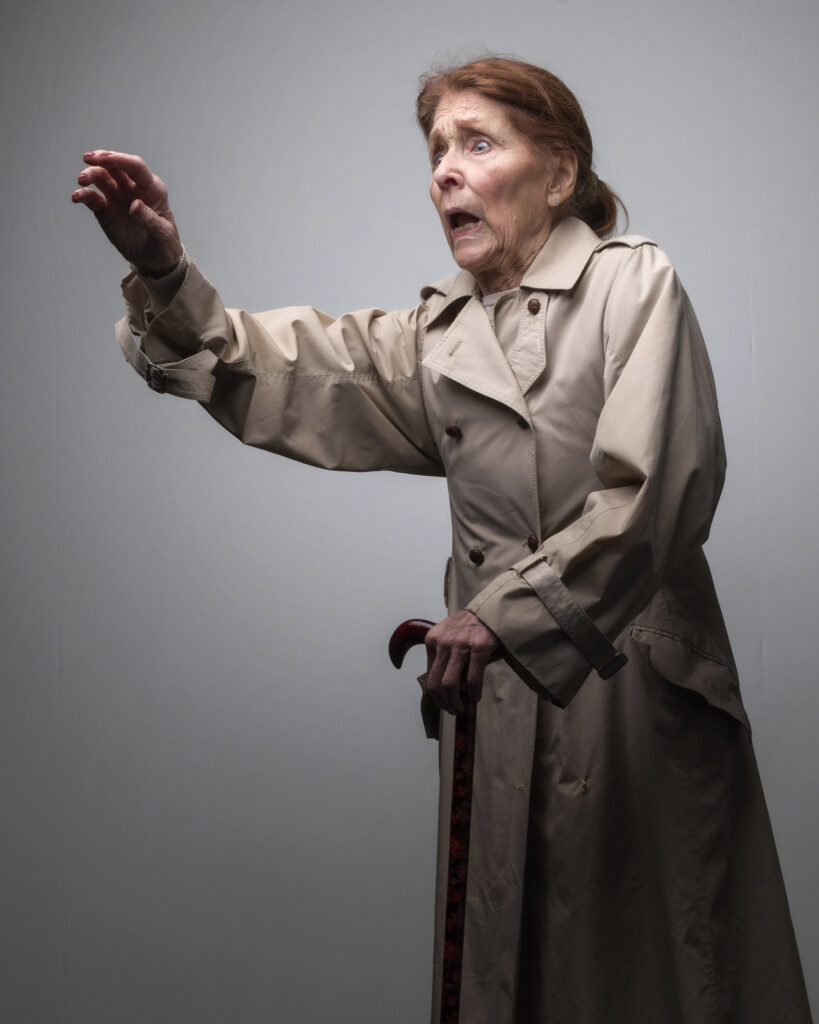PYGmalion Theatre Company has been on a golden run in recent productions stretching to last season and its latest featuring Julie Jensen’s Last Lists of My Mad Mother is stellar in every measure.
Directed by Morag Shepherd, this one-act gem is carried by the perfect chamber theater ensemble chemistry of actors Reb Fleming, Tamara Howell and Ariana Farber. Jensen’s 1998 play has a straightforward premise: Dot (Howell) has put her own life on hold to care for Ma (her mother, played by Fleming), whose memories are fading away faster than ever, as Alzheimer’s disease progresses. Meanwhile, Sis (Farber) stays at a distance, genuinely concerned yet also helpless about her mother’s condition but nevertheless feels compelled to advise Dot about other options for care.
Coming in at a tight 65-minute pace with precise rhythm in the dialogue, this performance of Last Lists extracts all of Jensen’s playwriting hallmarks: the meticulous use of language to signify the profound transitions between the main characters of Dot and Ma; the seamless, exquisitely balanced intertwining of disease and aging with the resolve to keep legacies and memories as resilient as ever in the relationship between mother and daughter; and humor that never dilutes nor compromises the authentic bittersweet emotions expressed in the dialogue.

Jensen, a Utah playwright who has seen more of her work produced outside of the state than any local peer to date, commands a precision of language that grounds the utter realism of such situations with a universal, timeless sense of humanity and humane conscience. Commissioned by the Mark Taper Forum in Los Angeles, the play’s eventual local premiere was produced by the Salt Lake Acting Company and Pygmalion Theatre Company’s first production of it came in 2011. The play also has been produced in Los Angeles, Key West, Hartford, Connecticut, and the Edinburgh Festival as well as a 2019 production by the WomensWork Theatre Collaborative in Rhode Island, among others.
Set in the 1990s, the play’s lines are as fresh as ever in 2024. Fleming, who was the company’s first artistic director, fully embodies the role of Ma with total credibility. In a press statement, she said that she prepared for the role by “reviewing research related to memory loss in aging, watch[ing] videos that respectfully portray the lives of those suffering from Alzheimer’s and loss of memory, and [meeting] an hospice nurse for consultation and advice based upon her years of assisting and loving people through end stages of life.”
Ma still obsesses over the strict grammar and precision of language that was part of the prime of her life when she was a teacher. But her obsessions also are about solitaire, bows and ribbons, a dead deer, the mail which must be checked at 10:30 every morning and a breakfast cereal that is insufficient in keeping her weight up.
Howell shines in an unforgettable performance, never losing sight of a daughter’s commitment to juggle the balls of compassion, humor and patience without losing any of them, for the sake that she might finally snap in anger or frustration if she does drop one. Despite Ma’s failing mental faculties, Dot discovers fleeting lucid moments, reminding her of their mother-daughter relationship, as Ma briefly escapes the strengthening clutches of helplessness and vulnerabilities.

Farber masters the unique role she plays, observing from a distance on stage, with a mix of regret and guilt that she cannot summon the mental strength as her sister has done in caring for their mother. As Sis, Farber provides a fine-line connection to us in the audience, to absorb and comprehend the experience of what we are witnessing between Dot and Ma.
One of the most important exchanges between Dot and Sis gets to the crux of the play’s title. Near the end of another frustrating phone call, Sis tells Dot that she does not want to fight, adding, “we’re in this together.” Realizing that Dot has not said another word, Sis says that she can’t talk any longer because the kids are home. Dot says, “Cookies and milk time, is it?,” to which Sis says, “No jokes about the children.”
After a few more terse exchanges, to which Sis wonders if her sister is finished, Dot lets the words fly: “Yes. No. Put this on the list. When I can’t remember the word for ‘fridge’ pull my plug. … When I can’t remember how to water the plants, give me a hall pass. Put that on the list. And when I can’t remember how to turn the knob on a door, it’s time to sell the farm. Put that on the list. Time to sell the farm, cash in the store. Time to drive the black limo south.”

Sis is taken aback but it also stirs the cathartic feelings in the burdens women carry as witnesses, especially when the emotions for some become too painful to bear sufficiently watching first hand what is happening to a loved one. Jensen, now 81, penned a brief note for the playbill of this newest production, opening with the fact that her mother had died of complications from Alzheimer’s almost 30 years ago: “This is not her story, nor is it my story, or my sister’s. Some events come from my life, others from others, and some events are pure invention. This play is dedicated to the hundreds of thousands of caretakers. They are the heroes; I was not. I am now the same age as my mother when she died. I see this play differently now. My friends are in nursing homes, others taken care of by valiant partners or dedicated daughters. And still no answers, not even to the easiest one of all: giving us a loving, peaceful way to die, when living no longer makes sense.”
This is an exceptional production in every regard, framed beautifully by Allen Smith’s set design, with sheets of papers indicating Ma’s days as a teacher. As one moves across the set, the school worksheets become fragmented and disjointed at the other side, with progressively widened gaps. This is matched by black-and-white tile flooring that gives way to becoming fragmented and disjointed in the same manner.
Performances continue through Feb. 24 in the Black Box Theatre in the Rose Wagner Center for Performing Arts (Thursdays and Fridays at 7:30 p.m., Saturdays at 4 p.m. and Sundays at 2 p.m.). For tickets, see here.
